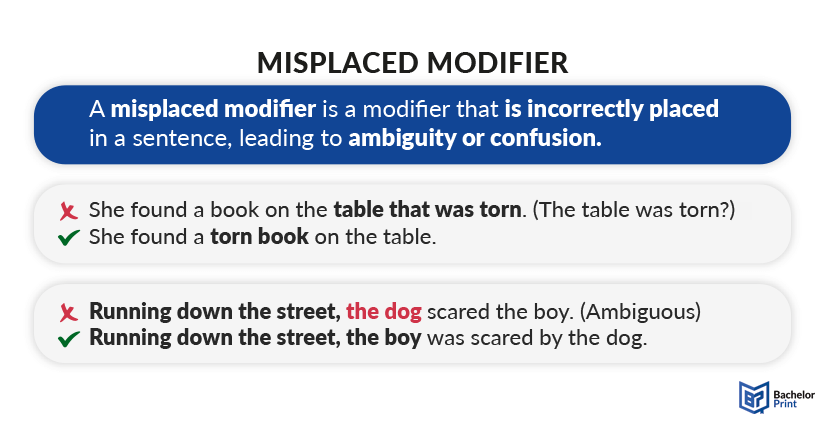
Misplaced modifiers are grammatical modifiers that are positioned improperly within a sentence. This can often result in situations where it is ambiguous what part of the sentence is being modified, altering the way in which the sentence is interpreted. Misplaced modifiers, if not addressed appropriately as per language rules, can obscure the intended meaning in academic writing.
Definition: Misplaced modifier
A modifier within a sentence is defined by the Cambridge Dictionary as “a word or phrase that is used with another word or phrase to limit or add to its meaning”. With this in mind, misplaced modifiers can be described as grammatical modifiers, which are incorrectly placed within a sentence, obscuring the intended meaning.

Types
There are a few types of misplaced modifiers to be aware of:
Misplaced adjectives
Here, “new” incorrectly modifies the student instead of the book, changing the meaning of the sentence. Although both sentences are logical, their correctness depends on what the writer/speaker wanted to portray.
Misplaced adverbs
When an adverb is placed in a different part of a sentence, it can change the entire meaning.
The adverb’s placement in the first sentence implies that Hanna was the only one kicked out, while the second sentence means that Hanna was kicked out now in this moment.
| Adverb placement | Meaning |
|---|---|
| I have only been playing guitar for a year. | Only one year of playing the guitar. |
| I have been playing guitar only for a year. | Exclusively playing the guitar. |
| Running quickly can improve fitness. | Running at speed will boost fitness. |
| Running can quickly improve fitness. | Fitness quickly improves through running. |
The English language does not have strict universal rules for where adverbs should be placed, as they can appear at the start of a sentence, before the verb, after the verb, or at the end of a sentence. Students should, therefore, take extra care when using adverbs and re-read sentences to make sure their placement provides the right meaning.
Misplaced prepositional phrases
A prepositional phrase can be misplaced if it seems to modify the wrong part of the sentence.
Undoubtedly, the black fur belongs to the cat and not the man, making the first sentence wrong.
Misplaced participial phrases
A participial phrase (a phrase starting with a verb ending in -ing or -ed) can create confusion when it’s not near the noun it’s modifying.
The first sentence falsely implies that the car was running down the street.
Dangling modifier
A dangling modifier occurs when the word or phrase that the modifier is supposed to modify is either missing or unclear, leading to confusion about what the modifier is describing.
In the corrected version, “I” is the subject, emphasizing that “I” was the one running late, not the train.
For a deep dive into dangling modifiers, click on the button below.
How to fix a misplaced modifier
With ambiguous modifiers or squinting modifiers, the misplaced modifier may usually be fixed by repositioning the modifier, so that the modified part of the sentence becomes clearer. With dangling modifiers, on the other hand, the misplaced modifier may often be fixed by inserting a subject next to the modifier.
The table below demonstrates some examples of misplaced modifiers and how they can be amended.
| Misplaced Modifier | Corrected |
|---|---|
| The man who runs loses weight regularly. | The man who runs regularly loses weight. |
| Reaching the peak, the wind blew. | When I reached the peak, the wind blew. |
| He walked up the road covered in mud. | Covered in mud, he walked up the road. |
| Visiting home, memories came back. | When I visited home, memories came back to me. |
Printing Your Thesis With BachelorPrint
- High-quality bindings with customizable embossing
- 3D live preview to check your work before ordering
- Free express delivery
Configure your binding now!
Misplaced modifier vs. dangling modifier
The main difference between dangling and misplaced modifiers is that a dangling modifier can’t be fixed by simply moving it to a different place in a sentence. In other words:
- Misplaced modifiers can be fixed by moving the modifier to a clearer position.
- Dangling modifiers need restructuring because they’re missing a subject.
FAQs
A misplaced modifier is a word, phrase, or clause that is incorrectly placed in a sentence, which leads to ambiguity or confusion about what it’s meant to modify. When a modifier is misplaced, it can make it seem like it’s describing the wrong noun, verb, or action.
- She almost drove the car for ten hours.
- She drove the car for almost ten hours.
The first sentence suggests that she almost drove the car, rather than driving for almost ten hours.
To fix a misplaced modifier, rearrange the sentence so that the modifier is closer to the word it’s meant to describe.
- She served sandwiches to the guests on paper plates.
- She served the sandwiches on paper plates to the guests.
The first sentence makes it sound like the guests were served on paper plates, rather than the sandwiches.
For a misplaced modifier, the modifier is placed incorrectly, but there is still a noun or pronoun for the modifier to describe. This can be fixed by moving it.
- She almost ran the entire marathon. → She ran almost the entire marathon.
For a dangling modifier, a noun or pronoun to modify is missing, making it unclear or nonsensical. It basically “dangles” without a clear subject. To fix it, you need to add the missing subject or rework the sentence.
- After finishing the homework, the TV was turned on. → After finishing the homework, I turned on the TV.